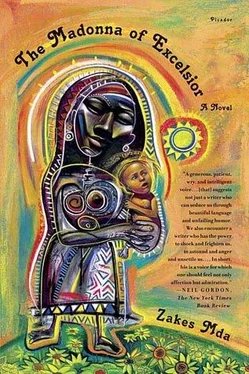It was obvious that the Reverend François Bornman missed his wife. He had never really gotten over her death some years ago. She had been sick for a long time, in pain from the cancer that was eating her insides. It had been a relief when she died. Her passing on to a better world had released her from the agonies of this world.
Fortunately this had happened at the time that Jacomina was having problems in her marriage to a medical doctor in Queens-town, far away in the Eastern Cape. Not that the dominee rejoiced at her marital problems. Marriage was created by God, and should last until such time that God decided to take one of the partners to His Kingdom. As He had done in the dominee’s own marriage. The only fortunate thing was that Jacomina had come home when her father needed her most. And had stayed. He had never really found out the details of the breakup.
When Jacomina’s husband had filed for divorce, she had refused to contest it, or to discuss the matter with her father. He never bothered her about it again. He just kept quiet and enjoyed her wonderful cooking. At least there had been no children in that marriage. Even a dominee could safely be grateful for small mercies.
The guests went for seconds. Captain Klein-Jan Lombard went for thirds and fourths, which brought a sharp rebuke from his wife, Liezl. People would think she did not feed him well at home, she said. Adam de Vries appealed to her to let the poor man eat. Policemen worked very hard. Their lot was not confined to chasing thieves. They were also burdened with the task of rooting out communists and terrorists from society.
Everyone agreed. And added that Tjaart must not be ashamed to pile his plate for the third time. After all, he was faced with a similar task. He was a soldier, a sergeant nogal, and everyone knew that military rations left much to be desired. Tjaart Cronje laughed and said that it was obvious that the speakers had not been in the army recently; otherwise they would know that military food rated with that of five-star hotel restaurants. Only Jacomina’s cooking could beat it.
Jacomina Bornman smiled coyly. Cornelia Cronje looked at her uncomfortably. Then at Tjaart. She was not pleased at the interest that Tjaart had lately been taking in Jacomina. She objected to the looming relationship because Jacomina was too old for her son. Jacomina had come back from a failed marriage. Jacomina had been a wild girl who had been caught necking with Greek boys in cars. In her protective mind, Ari Dukakis had multiplied into many Greek boys. His father’s Studebaker had become many cars. There was no guarantee that Jacomina had changed her ways. Perhaps that was why her marriage had failed. She must have taken her wild ways with her to Queenstown.
But it was obvious to all at the table that the two enjoyed each other’s company. They made each other laugh. They laughed at small things that others considered too stupid to laugh at. They saw humour in the unfunniest of situations. They were in love.
The Reverend François Bornman opened a bottle of mampoer, the peach brandy that had been donated by Johannes Smit when he sent his apologies, claiming that he could not be present at the dinner because of another engagement in Wepener. The truth was that there was no such engagement. Johannes Smit was wary of associating with these National Party types — traitors who were busy selling the country to the communists. So he had sent a servant over with a bottle of mampoer, and a concocted excuse about some prior engagement. The dominee had welcomed the peach brandy.
Johannes Smit’s pastime was to distil and brew all sorts of moonshine, and the dominee loved to sample these burning creations.
“If that’s one of Johannes’ concoctions, I will pass,” said Adam de Vries. He was a man of refined tastes and drank only whiskey. There was a bottle of J&B Scotch on the table, and he filled his glass as if it was soda. With his fingers, he fished out two pieces of ice from the ice bucket and sank them into the whiskey. He took two big swigs and put the glass on the table.
Tjaart sniffed at the mampoer in his glass. He had never tasted it before. He had only heard stories about it, that it was a potent traditional brandy of the Afrikaners. It was his patriotic duty to have a taste. Just a little sip. Jacomina laughed and grabbed the glass from his squirming hand. She said she was going to show him how it was done, and gulped it down. Cornelia gulped the air in undisguised shock. The other two women, Lizette and Liezl, sipped their alcohol-free ginger beer nonchalantly.
“Groot-Jan would have loved this,” said the dominee, pouring himself another glass of the peach brandy. “He used to enjoy Johannes Smit’s little experiments — especially the cherry liqueur and the mampoer.”
Groot-Jan Lombard had died about eighteen months before.
He had never really been the same since the Excelsior 19 case. His health had slowly deteriorated, until one day he had peacefully met his Maker in his sleep. The party banqueting at this table, however, did not remember him as one of the actors in the Excelsior 19 capers — victims of the sins of our mothers — but as a connoisseur of the good waters. And a great Afrikaner patriot.
“Oupa Groot-Jan was a true hero of the Afrikaner people,” said Tjaart, the mampoer making him bold enough to express his views in the company of revered elders. “We read his name every Sunday outside the church as one of those who led the Great Trek commemoration of 1938. Maybe it is good that he died when he did. He was saved the humiliation of seeing the Afrikaner bite the dust.”
“Bite the dust?” asked Klein-Jan Lombard.
“What are you talking about, my boy?” asked the Reverend François Bornman.
“He doesn’t really mean that, Pa,” said Jacomina Bornman.
“The Afrikaner will never bite the dust,” asserted Adam de Vries.
“We are releasing communists from jail,” said Tjaart Cronje, standing his ground. “We are allowing terrorists to come back into the country. We are now negotiating with them to be part of our government. Things are happening today that are inconceivable.”
“It’s all in the plan, my boy,” said Adam de Vries sagely. “Nothing inconceivable.”
He explained to the ignorant young man that President F.W. de Klerk was thinking only of the future of the Afrikaner people when he released the likes of Mandela from jail. It was part of de Klerk’s wisdom. He would never just hand over power to the blacks without making sure that the Afrikaner had a meaningful stake. The rights of the Afrikaner would always be protected. Adam de Vries assured the doubting upstart that the Afrikaner would never lose his grip on power. The people who were being released from jail were no longer agitators. Prison had extinguished the fire in them. They were now moderates who were willing to negotiate a just settlement. That was what the referendum had been about. A just settlement. Power-sharing. The majority of the white people had spoken through the referendum, saying that they wanted power-sharing with moderate blacks. Not majority rule. There could never be majority rule. Power-sharing, the sage explained, did not mean that the Afrikaner was handing over his power. Unless Tjaart wanted to believe extreme right-wingers like Johannes Smit. The Afrikaner would always have the power.
“But how can the blacks share power with the white man in our own country?” asked Tjaart Cronje. “What does a black person know about power? All he knows is how to burn down schools. Look what is happening in their location here in Excelsior. They have forced out the Bantu councillors. The location is now ungovernable.”
Tjaart Cronje was talking about the recent events in Mahlat-swetsa Location. Viliki had led the community in demonstrations against the Bantu Council, a National Party government-created structure through which the Afrikaners of Excelsior governed the township by proxy through people like Sekatle. Sekatle had in fact been the chairman of the Bantu Council, and therefore the mayor of Mahlatswetsa Location. Until he was frogmarched from the council office to his house, where the people of the Movement instructed him to retire from public life. They had threatened to burn his trading store, his lorry and his new BMW 3 Series car if he refused to disband his illegitimate council. The council members, many of them schoolteachers and traders like Sekatle, did not wait to be told twice. They had resigned en masse for fear of their lives and property.
Читать дальше












